The Changing Landscape of Gaming
The Entertainment Software Association’s latest Power of Play survey has revealed some fascinating insights into the world of gaming. With 24,216 participants from 21 countries across six continents, the study sheds light on gamer demographics and motivations.
One of the standout findings is that the average age of gamers is 41, challenging the outdated stereotype that gaming is primarily for the younger demographic. Additionally, the survey shows a near-even split between male and female gamers, with 51% being men and 48% women.
The survey also delves into the reasons why people play games. Unsurprisingly, the top motivation cited by 66% of respondents is to have fun. Following closely behind is stress relief and relaxation at 58%, showcasing the diverse benefits that gaming can offer.
Furthermore, the survey highlights the various advantages of gaming. From providing mental stimulation to reducing stress and anxiety, games have become a source of social connection and personal growth for many players.
The benefits of gaming
Interestingly, the survey reveals that gaming has also facilitated meaningful relationships and improved family dynamics. A significant number of gamers have met close friends or partners through gaming, while many parents believe that games have strengthened their bond with their children.

When it comes to skill development, games are seen as a valuable tool for enhancing creativity, problem-solving, and teamwork. Participants also reported improvements in real-world athletic skills and educational/career pathways as a result of gaming.
Notably, mobile devices have emerged as the preferred gaming platform across all age groups. While consoles and PCs remain popular choices, mobile gaming has gained widespread appeal, sparking discussions about the evolving definition of a “gamer.”